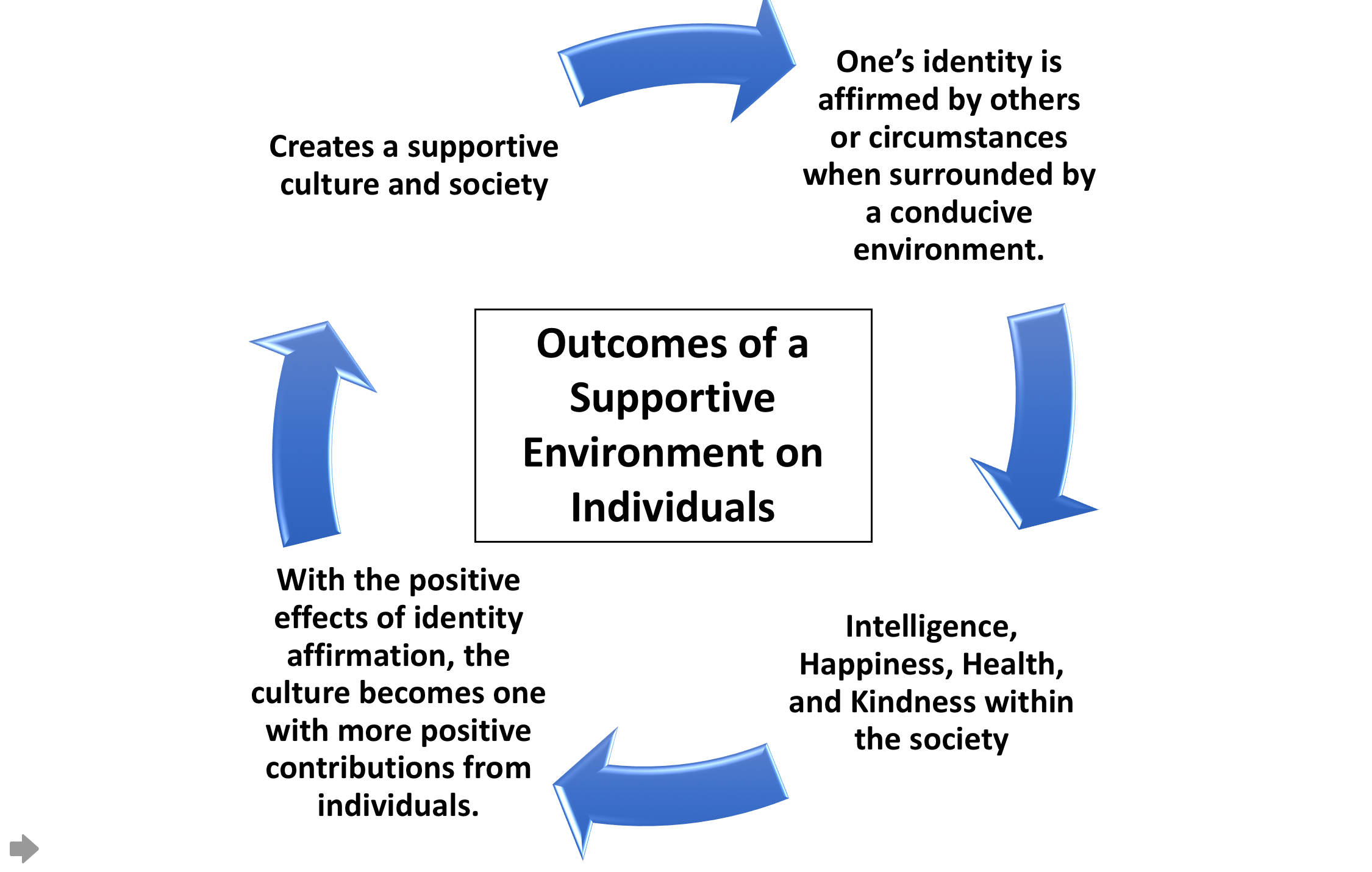|
Bicultural Identity
Bicultural identity is the condition of being oneself regarding the combination of two cultures. The term can also be defined as biculturalism, which is the presence of two different cultures in the same country or region. As a general term, culture involves the behaviors and belief characteristics of a particular social, ethnic, or age group. Within culture, we have cultural effects, which are the shared behaviors and customs we learn from the institutions around us. An example of a cultural effect would be how an individual's personality is strongly influenced by the biological and social norms he is exposed to. Another cultural effect would be that in some societies it would be more acceptable to dress or act in a certain way. In regards to bicultural identity, an individual may face conflict assimilating into both cultures or finding a balance between both. An individual may face challenges assimilating into the whole, collective culture. Similarly, an individual may face d ... [...More Info...] [...Related Items...] OR: [Wikipedia] [Google] [Baidu] |
Biculturalism
Biculturalism in sociology describes the co-existence, to varying degrees, of two originally distinct cultures. Official policy recognizing, fostering, or encouraging biculturalism typically emerges in countries that have emerged from a history of national or ethnic conflict in which neither side has gained complete victory. This condition usually arises from colonial settlement. Resulting conflicts may take place either between the colonisers and indigenous peoples (as in Fiji) and/or between rival groups of colonisers (as in, for example, South Africa). A deliberate policy of biculturalism influences the structures and decisions of governments to ensure that they allocate political and economic power and influence equitably between people and/or groups identified with each side of the cultural divide. Examples include the conflicts between Anglophone and Francophone Canadians, between Anglophone White South Africans and Boers, and between the indigenous Māori people and ... [...More Info...] [...Related Items...] OR: [Wikipedia] [Google] [Baidu] |
Acculturation
Acculturation is a process of social, psychological, and cultural change that stems from the balancing of two cultures while adapting to the prevailing culture of the society. Acculturation is a process in which an individual adopts, acquires and adjusts to a new cultural environment as a result of being placed into a new culture, or when another culture is brought to someone. Individuals of a differing culture try to incorporate themselves into the new more prevalent culture by participating in aspects of the more prevalent culture, such as their traditions, but still hold onto their original cultural values and traditions. The effects of acculturation can be seen at multiple levels in both the devotee of the prevailing culture and those who are assimilating into the culture. At this group level, acculturation often results in changes to culture, religious practices, health care, and other social institutions. There are also significant ramifications on the food, clothing, and la ... [...More Info...] [...Related Items...] OR: [Wikipedia] [Google] [Baidu] |
Interculturalism
Interculturalism is a political movement that supports cross-cultural dialogue and challenging self-segregation tendencies within cultures.John Nagle, Multiculturalism's Double-Bind: Creating Inclusivity Cosmopolitanism and Difference. Ashgate Publishing, Ltd., 2009. P. 169. Interculturalism involves moving beyond mere passive acceptance of a multicultural fact of multiple cultures effectively existing in a society and instead promotes dialogue and interaction between cultures. Interculturalism is often used to describe the set of relations between indigenous and western ideals, grounded in values of mutual respect. Origin Interculturalism has arisen in response to criticisms of existing policies of multiculturalism, such as criticisms that such policies had failed to create inclusion of different cultures within society, but instead have divided society by legitimizing segregated separate communities that have isolated themselves and accentuated their specificity. It is based o ... [...More Info...] [...Related Items...] OR: [Wikipedia] [Google] [Baidu] |
Majority–minority Relations
The term 'minority group' has different usages depending on the context. According to its common usage, a minority group can simply be understood in terms of demographic sizes within a population: i.e. a group in society with the least number of individuals is therefore the 'minority'. However, in terms of sociology, economics, and politics; a demographic which takes up the smallest fraction of the population is not necessarily the 'minority'. In the academic context, 'minority' and 'majority' groups are more appropriately understood in terms of hierarchical power structures. For example, in South Africa during Apartheid, white Europeans held virtually all social, economic, and political power over black Africans. For this reason, black Africans are the 'minority group', despite the fact that they outnumber white Europeans in South Africa. This is why academics more frequently use the term 'minority group' to refer to a category of people who experience relative disadvantage as c ... [...More Info...] [...Related Items...] OR: [Wikipedia] [Google] [Baidu] |
Cross-cultural Psychology
Cross-cultural psychology is the scientific study of human behavior and mental processes, including both their variability and invariance, under diverse cultural conditions. Through expanding research methodologies to recognize cultural variance in behavior, language, and meaning it seeks to extend and develop psychology.Gielen, U. P., & Roopnarine, J. L. (Eds.). (2016). ''Childhood and adolescence: Cross-cultural perspectives and applications'' (2nd ed.). Santa Barbara, CA: Praeger. Since psychology as an academic discipline was developed largely in North America and Europe, some psychologists became concerned that constructs and phenomena accepted as universal were not as invariant as previously assumed, especially since many attempts to replicate notable experiments in other cultures had varying success.Smith, Peter B., Fischer, R., Vignoles, V. L. & Bond, M. H. (Eds.). (2013). ''Understanding Social Psychology Across Cultures: Engaging with others in a changing world'' (2nd ed.) ... [...More Info...] [...Related Items...] OR: [Wikipedia] [Google] [Baidu] |
Personality
Personality is the characteristic sets of behaviors, cognitions, and emotional patterns that are formed from biological and environmental factors, and which change over time. While there is no generally agreed-upon definition of personality, most theories focus on motivation and psychological interactions with the environment one is surrounded by. Trait-based personality theories, such as those defined by Raymond Cattell, define personality as traits that predict an individual's behavior. On the other hand, more behaviorally-based approaches define personality through learning and habits. Nevertheless, most theories view personality as relatively stable. The study of the psychology of personality, called personality psychology, attempts to explain the tendencies that underlie differences in behavior. Psychologists have taken many different approaches to the study of personality, including biological, cognitive, learning, and trait-based theories, as well as psychodynamic, and hum ... [...More Info...] [...Related Items...] OR: [Wikipedia] [Google] [Baidu] |
Plurilingualism
Plurilingualism is the ability of a person who has competence in more than one language to switch between multiple languages depending on the situation for ease of communication. Plurilingualism is different from code-switching in that plurilingualism refers to the ability of an individual to use multiple languages, while code-switching is the act of using multiple languages together. Plurilinguals practice multiple languages and are able to switch between them when necessary without much difficulty. Although plurilingualism is derived from multilingualism (also referred to as bilingualism), there is a difference between the two. Multilingualism is connected to situations wherein multiple languages exist side-by-side in a society but are utilized separately. In essence, multilingualism is the coexisting knowledge of separate languages while plurilingualism is the interconnected knowledge of multiple languages. In general, plurilinguals have had contact with languages not native to th ... [...More Info...] [...Related Items...] OR: [Wikipedia] [Google] [Baidu] |
Bilingualism
Multilingualism is the use of more than one language, either by an individual speaker or by a group of speakers. It is believed that multilingual speakers outnumber monolingual speakers in the world's population. More than half of all Europeans claim to speak at least one language other than their mother tongue; but many read and write in one language. Multilingualism is advantageous for people wanting to participate in trade, globalization and cultural openness. Owing to the ease of access to information facilitated by the Internet, individuals' exposure to multiple languages has become increasingly possible. People who speak several languages are also called polyglots. Multilingual speakers have acquired and maintained at least one language during childhood, the so-called first language (L1). The first language (sometimes also referred to as the mother tongue) is usually acquired without formal education, by mechanisms about which scholars disagree. Children acquirin ... [...More Info...] [...Related Items...] OR: [Wikipedia] [Google] [Baidu] |
Identity Politics
Identity politics is a political approach wherein people of a particular race, nationality, religion, gender, sexual orientation, social background, social class, or other identifying factors develop political agendas that are based upon these identities. Identity politics is deeply connected with the idea that some groups in society are oppressed and begins with analysis of that oppression. The term is used primarily to describe political movements in western societies, covering nationalist, multicultural, women's rights, civil rights, and LGBT movements. The term "identity politics" dates to the late twentieth century although it had precursors in the writings of individuals such as Mary Wollstonecraft and Frantz Fanon. Many contemporary advocates of identity politics take an intersectional perspective, which accounts for the range of interacting systems of oppression that may affect their lives and come from their various identities. According to many who describe themselves ... [...More Info...] [...Related Items...] OR: [Wikipedia] [Google] [Baidu] |
Identity (social Science)
Identity is the qualities, beliefs, personality traits, appearance, and/or expressions that characterize a person or group.Compare ''Collins Dictionary of Sociology'', quoted in In sociology, emphasis is placed on collective identity, in which an individual's identity is strongly associated with role-behavior or the collection of group memberships that define them. According to Peter Burke, "Identities tell us who we are and they announce to others who we are." Identities subsequently guide behavior, leading "fathers" to behave like "fathers" and "nurses" to act like "nurses." In psychology, the term "identity" is most commonly used to describe personal identity, or the distinctive qualities or traits that make an individual unique. Identities are strongly associated with self-concept, self-image (one's mental model of oneself), self-esteem, and individuality. Individuals' identities are situated, but also contextual, situationally adaptive and changing. Despite their fluid cha ... [...More Info...] [...Related Items...] OR: [Wikipedia] [Google] [Baidu] |
Cultural Identity
Cultural identity is a part of a person's identity, or their self-conception and self-perception, and is related to nationality, ethnicity, religion, social class, generation, locality or any kind of social group that has its own distinct culture. In this way, cultural identity is both characteristic of the individual but also of the culturally identical group of members sharing the same cultural identity or upbringing. Cultural identity is a fluid process that is changed by different social, cultural, and historical experiences. Some people undergo more cultural identity changes as opposed to others, those who change less often have a clear cultural identity. This means that they have a dynamic yet stable integration of their culture. There are three pieces that make up a persons cultural identity, these are cultural knowledge, category label, and social connections. Cultural knowledge is when a person connects to their identity through understanding their culture's core charact ... [...More Info...] [...Related Items...] OR: [Wikipedia] [Google] [Baidu] |
Cultural Psychology
Cultural psychology is the study of how cultures reflect and shape the psychological processes of their members.Heine, S. J. (2011). ''Cultural Psychology. ''New York: W. W. Norton & Company. It is based on the premise that mind and culture are inseparable and mutually constitutive, meaning that people are shaped by their culture and their culture is also shaped by them.Fiske, A.; Kitayama, S.; Markus, H.R.; & Nisbett, R.E. (1998)The cultural matrix of social psychology In D. Gilbert & S. Fiske & G. Lindzey (Eds.), The Handbook of Social Psychology (4th ed., pp. 915–81). San Francisco: McGraw-Hill. Cultural psychology aims to define culture, its nature and function, specifically in relation to psychological phenomena. Gerd Baumann has argued: "Culture is not a real thing, but an abstract and purely analytical notion. In itself «it» does not «cause» behavior, but denotes an abstraction from it, and is thus neither normative nor predictive but a heuristic means towards explain ... [...More Info...] [...Related Items...] OR: [Wikipedia] [Google] [Baidu] |
.jpg)


_edited.jpg)

